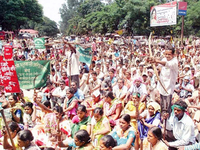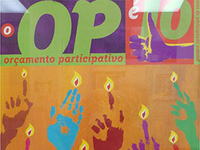Confronting Water Injustice

July 18, 2011
In the 1980s the United Nations ‘Water Decade’ had set the goal of bringing 40 liters of clean drinking water daily to every human being on earth by 1990.[1] Needless to say, we missed the target, as in 1990 around 17% of the world population lacked access to even 1 liter of safe water, while 40% lacked access to basic sanitation services. Then the UN adopted the Millennium Development Goals (MDGs) in the year 2000. These, in comparison with the goals of the Water Decade, look meaner, even regressive, perhaps as a result of the influence of the free-market conservatism that became dominant in the 1990s.
The MDGs for basic water and sanitation services envisage halving the proportion of the world population lacking access to these services by 2015. Although some experts claim that the new goals are more ‘realistic’ than those of the 1980s, in practice it means to accept that millions of human beings will continue to suffer and die from preventable diseases for the foreseeable future. In fact, official reports of the UN bodies monitoring the progress of the MDGs show that in some of the poorest regions of the world the situation will worsen, and though most countries may achieve the target for clean water many will fail to meet the sanitation target. To make matters worse, meeting the MDGs for water and sanitation may also imply worsening environmental conditions, as more fresh water would have to be withdrawn to satisfy the unserved population and there will be a significant increase of wastewater flows. If we take into account that in the Global South only about 5% of wastewater receives some form of treatment before being released into the environment, among other reasons because of the enormous costs involved, it becomes clear that meeting the MDGs not only requires substantive economic, financial and logistic efforts but also has very thorny and long-term ethical and political implications.
Social struggles and the commodification of the public good
The international predicament on this matter can be illustrated by the fact that a UN initiative to declare daily access to a few liters of clean water to be a “human right” has been firmly opposed by many countries, particularly in the rich North. Although in 2010 the UN finally managed to get a majority vote in favor of making access to water a human right, most of these countries that had opposed the initiative abstained from voting. This is not unconnected with the fact that since the 1980s mainstream public policies promoted worldwide to ‘solve’ the water and sanitation crisis were centered on the privatization and commodification of water and water-based services, which required the abandonment of the notion that access to basic services is a social or public good. Although straightforward water privatization policies have been defeated in many countries, the process of commodification is relentless and proceeds independently of the public, private or ‘civil society’ identity of the service providers. Public companies are often required to behave as private businesses, placing economic efficiency (often understood as ‘profit’) before social efficacy (i.e. providing a universal service to everyone independently of their capacity to pay). Also, many public operators have to enter into public-private ‘partnerships’, often a de facto privatization with a different name, in order to get access to investment funds. These and other problems, including the protracted practices of corruption, inefficiency and unaccountability characterizing the running of public services in many cases, and not just in poor countries, continue to be the source of mushrooming social and political confrontations.
Access to basic water and sanitation services is clearly a fundamental aspect of civilized life that continues to be beyond the reach of a large proportion of human beings. However, the problems highlighted above are just the tip of the iceberg of the structural conditions of inequality and injustice characterizing the relationship of humans with water, and more generally with the natural environment. Without moving out of the water topic it would still take much space to provide even a sketchy description of the multidimensional character of these conditions. There are, however, some issues of particular salience that have to be mentioned in this short piece. These include the uncontrolled expansion of opencast mining, which since the 1990s has been extended to regions of the planet where mining had been rather marginal as in much of Latin America. Currently, opencast mining from Mexico to Patagonia is destroying glaciers and forests, contaminating water and soil with cyanide, mercury and other harmful substances, and displacing – often forcefully – or poisoning human populations. At the root of continued – though often silenced or hidden – social struggles worldwide are: the unabated deforestation with significant consequences for hydrogeological systems, human communities and global climatic patterns more generally; the construction of massive water infrastructure works including dams, river diversions, and hydroways; and the destruction of fragile water ecosystems such as mangroves and wetlands to make room for the expansion of business activities.
Confronting water inequality and injustice
From a sociological perspective that places emphasis on the transformative potential of scientific knowledge, these processes have a two-sided character: they are worthy and relevant as intellectual objects of study, but the knowledge resulting from such intellectual endeavors has also very practical, material, and fundamentally political consequences, whether this is recognized or not. This a fundamental premise of current inter- and transdisciplinary research efforts on issues of water inequality and injustice in Latin America and the Caribbean, conducted by the research network WATERLAT (www.waterlat.org). The network’s research approach is framed by three main assumptions:
1) The capitalist character of water government and management. The fact that the central dynamic that increasingly structures the activities related to water government and management worldwide is largely driven by the process of capital accumulation. Considerations such as the need to tackle environmental unsustainability, inequality, and injustice are subordinated to the dominant dynamics of the accumulation process.
2) The sociogenesis of defencelessness[2] in relation to water. Human beings are exposed to a wide range of dangers and hazards related to the ways in which water is governed and managed. These dangers and hazards are derived from a number of causes – from the lack of access to clean water and essential water services to the exposure to natural or anthropogenic phenomena such as floods, droughts, or pollution. Despite increasingly sophisticated techno-scientific knowledge and capacity for foresight and intervention, such dangers and hazards continue to be among the biggest threats to human civilization. WATERLAT places emphasis not only on the study of human vulnerability and fragility but more fundamentally on the sociogenesis of the defencelessness affecting a large proportion of the world population in relation to these threats.
3) Confronting defencelessness through the substantive democratization of water use, management and control, but also the democratization of the production of and access to knowledge about water. WATERLAT adopts a transdisciplinary approach, that brings together academics and a wide array of social actors involved in the struggle to democratize these water-related activities. These actors include policy makers and implementers, water managers, social movements, labor unions, environmental organizations, and indigenous communities among others.
WATERLAT held its 2010 annual meeting in São Paulo, Brazil, which included a 3-day international conference on “The tension between social and environmental justice: the case of water management”. The conference had around 300 participants from Argentina, Bolivia, Brazil, Canada, Chile, Colombia, Costa Rica, Ecuador, Haiti, Italy, Mexico, Nicaragua, Peru, Spain, Sweden, the UK, Uruguay, and Venezuela. An electronic book with over 100 papers (most in Spanish and Portuguese) presented at the event is available online (http://www.waterlat.org/publications.html), and a DVD with a synthesis of the activities, including video recordings of keynote speeches and interviews with participants is also available on request (e-mail: waterlat@ncl.ac.uk).
The next meeting of the network will take place in Mexico City on 24-26 October 2011, and will be hosted by the Latin American Faculty of Social Sciences (FLACSO Mexico), one of the network partners. The event will be dedicated to “The struggle against water inequality and injustice in Latin America and the Caribbean”, and will feature keynote conferences, round tables, workshops, and public meetings. Each day will centre around one theme. The first day will be focused on “Forms of water inequality, injustice and defencelessness”, while the second will address issues of “Inequality, injustice and defencelessness in the water-public health interface”. Finally, the third day will concentrate on “Confronting water inequality, injustice and defencelessness: an x-disciplinary challenge”. Updating information about the meeting will be available on line at: http://www.waterlat.org/AcademicEvents.html.
[1] 40 liters is according to some estimates the minimum amount of safe water required to satisfy basic needs.
[2] While ‘vulnerability’ implies the propensity to be wounded or suffer attacks and ‘fragility’ is the quality or state of a thing that can be easily broken or destroyed, ‘defencelessness’ incorporates the social dimension of the problem: it is the property of human beings lacking the means to defend themselves, that is, the property of being disarmed.
José Esteban Castro, Newcastle University, UK, and ISA Program Committee












